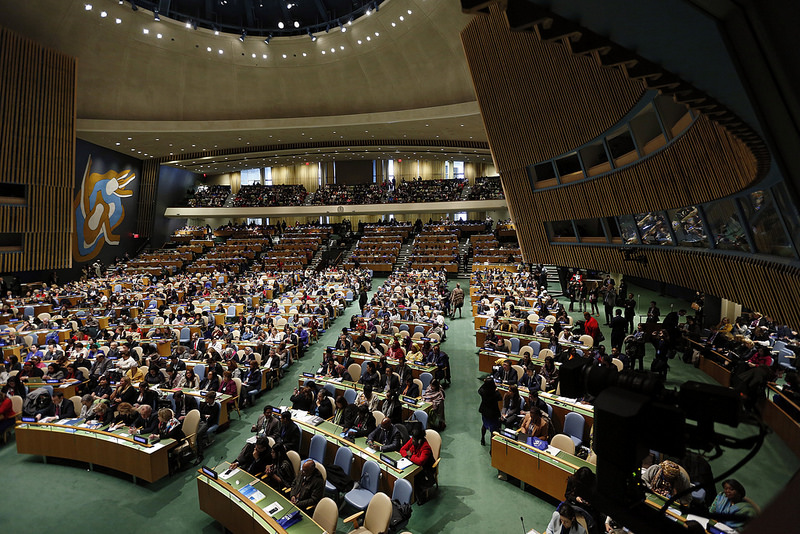Building peace in the Arab region, women’s groups spotlight progress and challenges
Date:

Three of the world’s worst humanitarian crises in the world are in the Arab Region. Five of the region's countries -Syria, Iraq, Yemen, Libya and Palestine- are going through open or protracted conflicts. Many more countries are dealing with the consequences of these conflicts with a constant influx of refugees and an alarming rise of violent extremism.
Amid the chaos, women are struggling, not only to cope with their new, conflict-ridden lives, but also to reach the peacemaking tables and make their voices heard. On 15 March at the Permanent Mission of Ireland to the UN in New York, a side event to the 60th Commission on the Status of Women featured a rich discussion by Arab women activists from Karama, an Arab women’s network and grantee of UN Women’s Fund for Gender Equality, about women’s contribution to the peace building processes across the region.
Mouna Ghanam, a Syrian peace activist, joined the conversation from Geneva where she serves as part of the recently formed Women’s Advisory Board to the UN Special Envoy for Syria, Staffan de Mistura. Building on years of UN Women’s work with Syrian women activists to galvanize a unified women’s peace agenda, Special Envoy de Mistura had invited in January this year 12 women representatives of Syrian civil society to form an Advisory Board to contribute to peace talks. “This advisory board is only the first step,” said Ms. Ghanem through video conference, “what we are aspiring for is not only participation, we are aspiring to be the decision makers and we have a long way to go.”
Since the adoption of the historic Security Council resolution 1325, the UN has led the international community in creating mechanisms and frameworks to include women in peacebuilding and focus on women in relief efforts during and after conflicts. However, when the time comes for actual peace talks, women’s representation in formal delegations remains meager at best. Between 1992 and 2011, fewer than four per cent of signatories to peace agreements and less than 10 per cent of negotiators at peace tables were women.[1]
Participants at the event also warned against the impact conflicts may have on undermining gains previously achieved by women. In Yemen, for example, they emphasized that the 2011 uprising had brought women and youth into the arena of activism at almost unprecedented rates. The National Dialogue Conference which drafted the pre-constitution document and drew the virtual roadmap of the transitional period included a 30 per cent representation of Yemeni women whose mark on articles pertaining to women’s rights in the final document was evident. However, as conflict erupted in Yemen last year, this progress came to a halt and nowwomen’s movements are fighting to keep what they achieved as their voices are being drowned out by the rhetoric of violence and counter-violence.
Another participant, Zahra’ Langhi, focused on Libyan women and their own fight for a seat at the table. Last year, UN Women supported a representative group of Libyan women to forge their unified peace agenda and present it to the international community and media at the Palais des Nations in Geneva. With the support of UN Women and the United Nations Support Mission to Libya, a Women’s Track was established within the formal National Dialogue of Libya. For many women, such efforts need to be amplified as women continue to be under-represented in the formal peace process.
“We are working on the horizontal, local reconciliations to build our own peace. This is the peace that will last; this will be sustainable peace. So, if we don’t have a place around the table, at the formal peace [process], we will create our own space,” said Ms. Langhi, a Libyan peace activist.
Speakers highlighted that for years, many national, regional and international organizations like Karama have advocated for the inclusion of women in peacebuilding and studies have repeatedly proven the value women add to peace negotiations. Since 2000, the Security Council has passed seven additional resolutions to galvanize resolution 1325 and provide enforcement mechanisms for the inclusion of women in peacemaking. Yet, major challenges continue to impede ambitious efforts to revolutionize how women are regarded in conflict and post conflict recovery efforts.
“Women’s participation is not just a political sound bite, which we really ended up with; women’s participation is the core of peace, democracy, human rights and justice because if you leave women behind, and they do not participate, then you leave behind the society itself,” said Hibaaq Osman, a Somalian activist and the founder of Karama who added that women “are not inside the room, they are still at the corridors.”